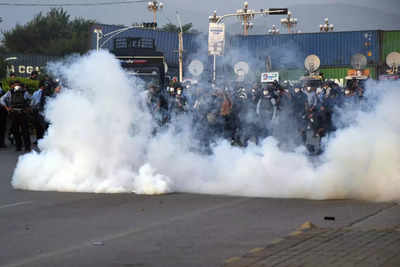
PESHAWAR: The death toll from sectarian violence in Pakistan’s restive Khyber Pakhtunkhwa province surged to 130, with at least six people killed and eight injured on Sunday, as clashes in the volatile Kurram district continued for the eleventh consecutive day.
The clashes between Alizai and Bagan tribes in the district started on November 22, after an attack on a convoy of passenger vans near Parachinar in which 47 people were killed a day earlier. Several passengers who had sustained grave injuries succumbed later, raising the toll in the convoy killing to 57.
Police said the situation remained tense, and violence persists despite a recent ceasefire agreement between the Sunni and Shia groups.
The six new deaths reported on Sunday brought the death toll to 130, while the total number of injured rose to 186 after eight fresh injuries were reported.
The 10-day truce brokered last week has been rendered ineffective by intermittent violence, which shows no signs of abating.
A high-powered delegation, including Khyber Pakhtunkhwa Chief Secretary Nadeem Aslam Chaudhry and IGP Akhtar Hayat Gandapur, had also negotiated a ceasefire last weekend, but violence resumed shortly afterwards.
Khyber Pakhtunkhwa Governor Faisal Karim Kundi earlier planned to dispatch members of the grand peace jirga (council of tribal leaders) from Kohat division to Kurram for engaging with leaders from both warring factions to negotiate peace.
Addressing a gathering of political leaders and tribal elders in Kohat on Sunday, he called for strict action with public cooperation to make the region weapon-free through joint operations.
He said he was ready to go to Kurram and stay there for as many days as the jirga suggested to ensure peace in the region.
“No other country or province will resolve our issues. We must take responsibility for improving the situation ourselves,” he said.
Kundi announced an All-Parties Conference (APC) for peace and the province’s rights and invited Chief Minister Ali Amin Gandapur to join it.
The governor stressed the role of religious scholars in promoting peace, urging them to focus on unity.
Several other leaders addressed the gathering, putting aside their ideological differences on other issues.
The continued violence forced the closure of the main Peshawar-Parachinar Road for travel, and commuting at the Pak-Afghan Kharlachi border has also been suspended.
The closure of the main arteries has created a scarcity of oil, food commodities and medicines in the region.
The Kurram region is also experiencing a communication blackout, with mobile and internet services suspended and educational institutions closed.
Police and other security forces personnel had been deployed in various parts of Lower Kurram, said Deputy Commissioner Javed Ullah Mehsud, adding that all-out efforts will be made for a truce in other areas today as well.
“We are hopeful for progress on a ceasefire and reopening of transport routes,” he stated.
Previous efforts to mediate peace, including a seven-day truce brokered by provincial officials in November have failed to hold.






